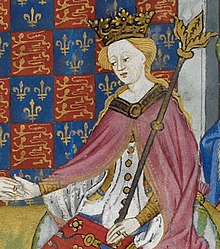
Back مارغريت أنجو Arabic مارجريت انجو ARZ Margarita d'Anjou AST Anjulu Marqarit Azerbaijani مارقارت آنژو AZB Margaret kan Anjou BCL Маргарита Анжуйска Bulgarian Marc'harid Anjev (1430-1482) Breton Margareta Napuljska BS Margarida d'Anjou Catalan
| Margaret of Anjou | |
|---|---|
 Detail from the Talbot Shrewsbury Book | |
| Queen consort of England | |
| Tenure |
|
| Coronation | 30 May 1445 |
| Queen consort of France | |
| Tenure | 23 April 1445 – 19 October 1453 |
| Born | 23 March 1430 Pont-à-Mousson, Duchy of Bar, Holy Roman Empire |
| Died | 25 August 1482 (aged 52) Dampierre-sur-Loire, Anjou, France |
| Burial | |
| Spouse | |
| Issue | Edward, Prince of Wales |
| House | Valois-Anjou |
| Father | René, King of Naples |
| Mother | Isabella, Duchess of Lorraine |
Margaret of Anjou (French: Marguerite; 23 March 1430 – 25 August 1482) was Queen of England by marriage to King Henry VI from 1445 to 1461 and again from 1470 to 1471. Through marriage, she was also nominally Queen of France from 1445 to 1453. Born in the Duchy of Lorraine into the House of Valois-Anjou, Margaret was the second eldest daughter of René of Anjou King of Naples, and Isabella, Duchess of Lorraine.
Margaret was one of the principal figures in the series of dynastic civil wars known as the Wars of the Roses and at times personally led the Lancastrian faction. Some of her contemporaries, such as the Duke of Suffolk, praised "her valiant courage and undaunted spirit" and the 16th-century historian Edward Hall described her personality in these terms: "This woman excelled all other, as well in beauty and favour, as in wit and policy, and was of stomach and courage, more like to a man, than a woman".[1]
Owing to her husband's frequent bouts of insanity, Margaret ruled the kingdom in his place. It was she who called for a Great Council in May 1455 that excluded the Yorkist faction headed by Richard of York, 3rd Duke of York. This provided the spark that ignited a civil conflict that lasted for more than 30 years, decimated the old nobility of England, and caused the deaths of thousands of men, including her only son, Edward of Westminster, Prince of Wales, at the Battle of Tewkesbury in 1471.
Margaret was taken prisoner by the victorious Yorkists after the Lancastrian defeat at Tewkesbury. In 1475, she was ransomed by her cousin, King Louis XI of France. She went to live in France as a poor relation of the French king, and she died there at the age of 52.
- ^ "Margaret of Anjou". BBC Radio 4. 24 May 2018. Retrieved 28 May 2020.